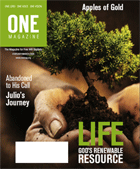
Life: God's Renewable resource
|
 |
intersect
The Inconvenient Beatitude
INTERSECT (Where the Bible Meets Life) is a regular column of ONE Magazine featuring Dr. Garnett Reid, a member of the Bible faculty at Free Will Baptist Bible College. Email Garnett greid@fwbbc.edu |
AS FAR AS THEY KNEW, they’d never see him again. The little band of men sat with Paul aboard a cramped freighter docked at the Lion’s Port on the Latonian Gulf. The setting sun reddened as it sank over the once-glorious city of Miletus on the Asia Minor coast. These brothers had traveled 25 miles overland from Ephesus, then crossed the 12-mile-wide gulf to sit at the apostle’s feet one last time.
Jesus’ Hardest Saying?
Paul’s discussion with them took several turns. He talked about his suffering, his total abandon in finishing Christ’s course for his life, and the truths he would die for—a death which might come sooner than later. After reminding them of his tears and warning them of grave dangers to their faith, Paul commends these Ephesian leaders to the Lord.
But he’s not through; there’s one more thing he adds. Paul quotes his Master, the Lord Jesus. These wordsof Jesus aren’t found anywhere else in the Bible. No gospel writer includes them. The saying is an otherwise unknown beatitude—perhaps Jesus’ hardest saying of all.
Simple Enough
After Paul mentions his own example of laboring to meet a need, he adds: “In all things I have shown you that by working hard in this way we must help the weak and remember the words of the Lord Jesus, how he himself said, ‘It is more blessed to give than to receive’” (Acts 20:35). The words are so simple that they need no detailed exegesis. All they need is practice.
When did Jesus say this? Was it when His disciples were watching the widow give her last mite to the temple treasury? Maybe He mentioned it to the 12 when He sent them out, or as He was giving away the 12 baskets of leftovers after He had fed the multitude. Jesus says almost the same thing in Luke 6:38: “Give, and it will be given to you.”
Perhaps it was in a different setting altogether, such as in one of those “down times” away from the crowds with His disciples. Whenever the Lord said these words, evidently they impressed Paul since he makes similar comments in Romans 15:1, Galatians 6:2, and Ephesians 4:28.
I Could—If I Would
Given human nature, I suspect Jesus had to repeat this beatitude often. The truth is we need to hear it ourselves over and over. In our culture of insatiable consumer capitalism where we produce mainly to satisfy our over-indulged lifestyles, what Jesus said cuts us to the heart. At least it should.
Paul saw it that way. He labored so that he could give to the weak. Maybe, just maybe, I ought to do that, too. I could cut back on what I spend on myself so that a missionary account wouldn’t be so far in the red. I could set a place at my table for an indigent man in the community I’ve been trying to win to Christ. I feel sure I could give up a Saturday round of golf to sit with a friend’s father in an assisted living home so my friend could have a few free hours. I could—if I would.
To be sure, there’s nothing wrong with receiving. Our Father gives us richly all things to enjoy, Paul himself says (1 Timothy 6:17). It’s good to receive. Receiving testifies to the goodness of the Giver to the receiver. But it’s better to give. Giving testifies to the goodness of the Giver in the receiver. That’s the real blessing.
|
|

